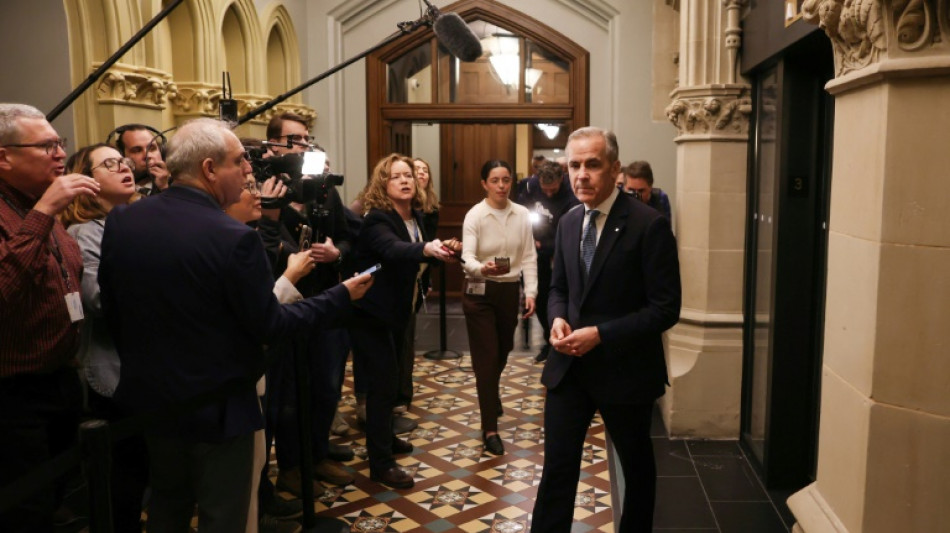

Canada party leaders hold high-stakes debate two weeks from vote
Canada's main party leaders face off Wednesday in a debate that could prove pivotal ahead of this month's election, with Prime Minister Mark Carney's French language skills set to be tested.
Carney's main rival on the stage in Montreal will be Pierre Poilievre, whose Conservative Party is trailing the Carney-led Liberals in most opinion polls ahead of the April 28 vote.
Carney, who took over as prime minister from Justin Trudeau on March 14, has argued that his experience as a central banker during periods of economic upheaval make him the ideal choice to confront US President Donald Trump, whose trade war threatens thousands of Canadian jobs and whose talk of annexing this country has people incensed.
Poilievre has also promised to stand firm against Trump, but argues that a decade of weak economic performance under the Trudeau-led Liberals has left Canada vulnerable to hostile US trade policies.
The leader of the left-wing New Democratic Party, Jagmeet Singh, the head of the Quebec separatist Bloc Quebecois, Yves-Francois Blanchet, and Green Party co-leader Jonathan Pedneault will also be on stage.
But in a departure from past Canadian elections, polls indicate this year's race is largely becoming a two-party contest, raising the debate stakes for Carney and Poilievre.
"This is really a two-horse race, and it isn't usually like that," said Laura Stephenson, head of the political science department at Western University.
"Seeing them talk to each other is going to be very important," she told AFP.
- Low expectations -
Wednesday's debate will be in French. An English language debate follows on Thursday.
In what could fairly be described as an only-in-Canada political moment, the start of Wednesday's French debate has been moved up two hours to minimize a scheduling conflict with the final regular season game of the Montreal Canadiens hockey team, a cherished institution in Quebec.
Carney's efforts to win votes in Quebec have drawn particular scrutiny because of his occasional struggles to articulate his positions in French.
Poilievre, like Carney, was raised in the western province of Alberta, but after two decades in parliament the Tory leader has developed into a proficient French speaker.
The Conservatives can forge a government by winning anglophone districts in the West and Ontario, but for the Liberals victory has typically run through Quebec.
The last three Liberal prime ministers -- Trudeau, Paul Martin and Jean Chretien -- had ties to Quebec and spoke fluent French.
Daniel Beland, director of McGill University's Institute for the Study of Canada, noted that "Carney's French has already been put under the microscope and so expectations are very low."
- 'We have to be united' -
There are also indications that Trump's aggression, including the trade war and threats to annex Canada, have altered the calculations of some francophone voters.
Carole Potvin, 70, told AFP she had previously voted for the Bloc Quebecois separatists but is considering voting Liberal this year.
"We feel threatened, and to face the American enemy we have to be united," the Montreal resident and retired supermarket saleswoman told AFP.
Carney's level of French "is not my concern today," she said.
Fifty-year-old Montreal resident Alexandre Tittley agreed.
"We have a disgusting global situation because of Trump, and what we're looking for above all is a leader with a good head on their shoulders," he said.
"The candidates' personalities are more important than their level of French."
Carney, a 60-year-old former investment banker who led the Bank of England and the Bank of Canada, has brought the Liberals back from potential political ruin.
On January 6, the day Trudeau said he would resign, the Liberals trailed the Conservatives by 24 points, according to the public broadcaster CBC's poll aggregator.
On Tuesday, the CBC data put the Liberals at 44 percent support, with the Tories at 37.9.
With a significant number of voters undecided, the race remains volatile.
Political analysts have criticised Poilievre, 45, for struggling to adjust his message in response to Trump, arguing he remains too attached to bombastic attacks on the Liberals instead of directing his ire at Washington.
Y.Niessen--JdB



